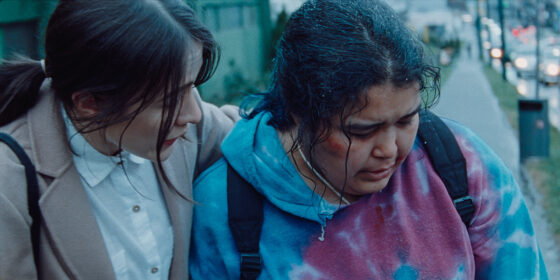The Body Remembers When the World Broke Open (Elle-Máijá Tailfeathers & Kathleen Hepburn, Canada/Norway) — Contemporary World Cinema

By Josh Cabrita
The sad, slow, melancholy words of Joni Mithcell’s “Little Green” feature prominently in a mournful scene from the latest by Vancouver filmmakers Kathleen Hepburn and Elle-Máijá Tailfeathers. While East Vancouver hipster Áila (Tailfeathers) speaks over the phone with a female crisis centre, the “extremely pregnant” Rosie (Violet Nelson)—whom the former happened upon soaked, shoeless, and with an abusive boyfriend in pursuit—latches onto a pair of headphones sitting atop a nearby record player. As she shields her ears from her host’s description of the aforementioned assault, Mitchell’s quiet lament fills the air.
In a film otherwise characterized by sudden circumstances and erratic decisions, this moment sticks out neither for its stasis (a temporary reprieve from the story’s otherwise unrelenting momentum) nor for its thematic relevance (Mithcell’s song is about a daughter she put up for adoption), but rather, for the dense interplay of conflicts so deftly modulated herein: the fact that Áila, who is half Blackfoot and half Sámi, signals her virtuousness (and superiority?) by speaking on the phone at a suspiciously high volume; the fact that Rosie remains ill at ease while this decidedly soothing tune evokes a disarming calm; and, perhaps most importantly, the fact that the Mitchell song seems to both unite these two Indigenous women (Áila voices her hesitation about having a child and, tellingly, already had “Little Green” queued) even as it suggests an apparent divide between them.
It’s for this reason—the close, real-time attention to behavioural nuance—that Hepburn and Tailfeathers have risked a formal gambit that could’ve easily seemed fraudulent: to tell the bulk of their story in an uninterrupted single take that follows our protagonists from their initial meeting all the way to the shelter where Áila has pressured Rosie to stay. This approach foregrounds the limited perspective of the camera, giving us glimpses and fragments of lives we do not fully know, and thus cannot fully judge. Just as the viewer is unable to completely grasp the histories that have shaped these two women, so they remain enigmas to each other. By the time Rosie and Áila are forced to go their separate ways, no lasting bond has developed between them; we’re instead to make do with a shared, fleeting sentiment that was already beautifully captured by that would-be lullaby from Blue: “Little green, have a happy ending.”
- « Previous
- 1
- 2


